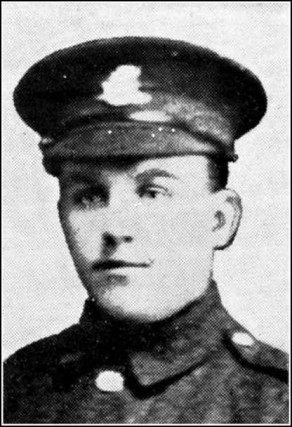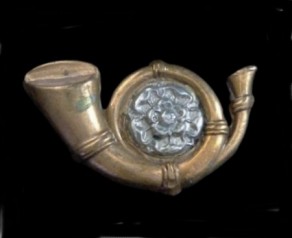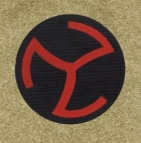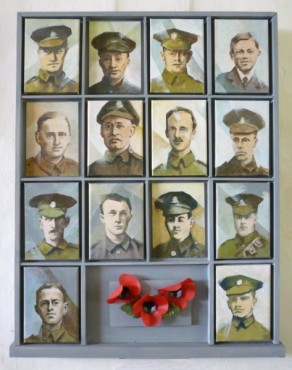'The Kendal Mercury' (20 October 1916)
(Kindly supplied by Sedbergh & District History Society)
PRVT. HARRY CLEMENT
Private Harry Clement, aged 22 years, who was killed in France in September was the son of Mr. and Mrs. John Clement, of Sedbergh. He joined the Army about ten months’ ago, and was first of all in the Duke of Wellington’s Regiment, and was afterwards transferred to the K.O.Y.L.I. He went out to France at the end of June this year. He was a bright, cheerful, and manly young fellow, and was well liked by all who knew him. Writing from France to the parents of the deceased, Private L.C. Dobson, K.O.Y.L.I., says:– “It is with deep regret that I write to tell you that your son Harry was killed on Friday, September 2nd, by a shell which burst at the side of him. It is a great loss to the gun section to which he belonged, as he was well liked by all who knew him. I have been his chum ever since we met at Broxton [Brocton], and we have spent many a happy hour together, and I feel his loss very keenly. May it be some consolation to you to know that he was a good soldier, and died doing his duty for his country. Please let me convey the sympathy of all the gunners to you.”
‘The Westmorland Gazette’ (28 October 1916)
(Kindly supplied by Sedbergh & District History Society)
MEMORIAL SERVICES – Sedbergh
An impressive service was held in Sedbergh Parish Church on Wednesday evening in memory of Sergt. H.L. Mason and Private H. Clemmet, both of the Duke of Wellington’s Regt., who were recently killed in action. As the large congregation was assembling the organist (Mr. A.E. Thorne) played Chopin’s ‘Marche Funèbre,’ and the service began with the singing of the hymn ‘The Son of God goes forth to war.’ This was followed by suitable prayers, the 130th Psalm, and a lesson. The officiating clergy were the vicar, the Rev. A.H. Walker, and the Rev. H.F. Donaldson-Selby. Other hymns sung were ‘Lead, kindly Light’ and ‘Peace, perfect peace.’ At the close the organist played the Dead March in ‘Saul,’ the congregation standing, and that piece of Mendelssohn’s which is known as his ‘Funeral March.’
'The Kendal Mercury' (3 November 1916)
(Kindly supplied by Sedbergh & District History Society)
SEDBERGH – MEMORIAL SERVICE
There was a large congregation in St. Andrew’s Church on Wednesday, when a memorial service was held in memory of Sergeant Lyddington Mason and Private Harry Clemmet, who have fallen in the war. The Vicar, the Rev. A.H. Walker, took the major portion of the service, and the lesson was read by the Rev. H.F. Donaldson of Selby. The special hymns were ‘The Son of God goes forth to war,’ ‘Lead kindly Light,’ and ‘Peace, perfect peace.’ At the conclusion of the service the organist, Mr. A.E. Thorne, played the ‘Dead March.’
‘The Westmorland Gazette’ (3 February 1917)
(Kindly supplied by Sedbergh & District History Society)
SEDBERGH – CONSERVATIVE CLUB
The annual meeting was held on Wednesday night, Mr. C.W. Gooch in the chair. – The financial statement showed that the past year started with a credit balance of £9 14s. 4d., and this had increased to £33 9s. 11d. In his report of the year’s working, Mr. G. Hall, the hon. secretary, referred to the loss of five members – Corpl. J.C. Leighton, Pte. J.C. Bateman, and Pte. H. Clemmet, killed in action; F,C. Bushby, died in hospital, and Pte. Herbert Park, drowned in the Mediterranean. He hoped the club would raise a permanent memorial to these men. He also read a letter from Mr. Walter Morrison, accompanying his annual subscription, and urging the members to keep the club going …
‘The Westmorland Gazette’ (22 September 1917)
(Kindly supplied by Sedbergh & District History Society)
CLEMMET – In loving memory of our dear son and brother, Pte. Henry Clemmet, K.O.Y.L.I., who was killed in action on September 22nd, 1916.
His loving ways and cheerful smiles are pleasant to recall,
He had a kindly word for each, and died beloved by all;
We have one consolation, he bravely did his best,
Somewhere in France our dear one sleeps a hero laid to rest.
From father, mother, sisters and brothers, and Wilfred. Guldry Terrace, Sedbergh.
WHEN THE SOMME RAN RED, by A. Radclyffe Dugmore
[Henry James Clemmet was in the draft, mentioned below, that joined the 10th (Service) Bn King's Own (Yorkshire Light Infantry) on the 11 July 1916.]
… Eventually the train arrived and took us to V–e [Ville-sur-Ancre] our old stamping ground. The distance was only a few miles, but many hours, very weary hours, were occupied in the journey. Soon after our arrival we received the new drafts. Men of many different regiments, some had been in the attack of July 1st, others were new arrivals who had not seen a trench, and it was a merry task sorting and arranging the lot. In fact the day was one of the busiest I have ever seen, rolls had to be made up, gas helmets tested, kits inspected, deficiencies made good, iron rations issued, (emergency rations, not to be used except by officer’s order) new N.C.O.s appointed and a thousand and one things to be done. Some of the new officers having come to add to the confusion, they had to be sized up and allotted to companies. It was midnight before we were able to get a chance to sleep and the orders were that we should proceed to Bottom Wood, beyond Fricourt the following morning. [12th July]
Any old soldier would have been amused had he seen us getting ready to move. The battalion had to be drawn up and roughly inspected, and owing to the restricted area it was necessary to move the companies about more or less. Being a Light Infantry regiment we have many pecularities [sic] as to drill and orders. One item being that the men are not called to attention and given the “slope’ums,” preparatory to moving, we simply say “move right (or left) in fours. Form fours–right” and off they go, springing to attention automatically as the first part of the move and marching off at the “trail.” Fully half of our new men knew nothing of our Light Infantry idiosyncrasies, and were completely lost. The idea of being expected to move without being called to attention or given the “slope” was too much for them. The result was one of grand and very glorious confusion, for which no one was to blame. At first our Colonel, who was a regular from a Highland Light Infantry regiment, and a splendid fellow, accustomed to having things done strictly according to rules and regulations, gazed with indignation and rapidly rising temper at the horrible muddle. A word whispered in his ear at the critical moment explained the situation and discipline or no discipline there was a suppressed giggle before the mongrel Battalion finally got under way with more or less uniformity of action.










No comments yet.